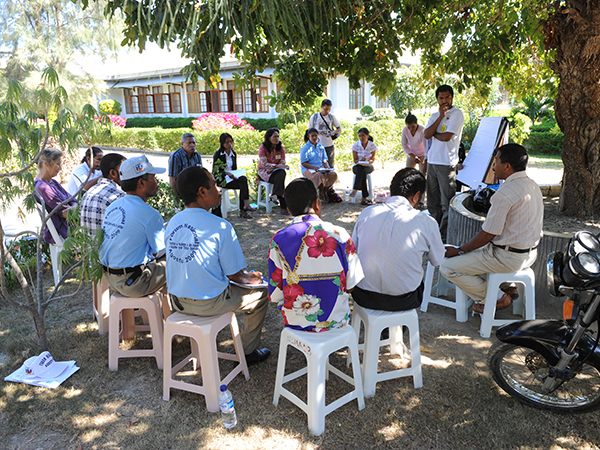CEPAD: Tackling corruption

FOR IMMEDIATE RELEASE
26 October 2011
Endemic corruption throughout Timor-Leste threatens to unravel the substantial achievements made to the democratization process since the country regained its independence in 2002.
Interpeace local partner, the Centre of Studies for Peace and Development (CEPAD), has just received funding from German-based development agency, MISEREOR, to tackle the issue of corruption, collusion and nepotism, locally known as ‘KKN’.
KKN touches every area of daily life in Timor-Leste. In 2010 the country ranked in 127th position out of 178 countries in Transparency International’s Corruption Perception Index. Anti-corruption legislation has been developed, however KKN is still rampant in Timorese society. In a recent study by Interpeace and the Centre of Studies for Peace and Development (CEPAD), which involved over 900 Timorese citizens, participants named KKN as one of the top four priority issues that needed to be addressed. “From the presumed actions of the political elite to the smallest transactions in local communities, this issue pervades all aspects of Timorese life.” (Timor-Leste Voices and Paths to Peace, September 2009).
As Executive Director of CEPAD, Timorese national João Boavida and his team are now starting to look at the issue in detail through a unique, inclusive approach. Boavida stresses the need for comprehensive action on the priority issue of KKN, noting that “In a post-conflict and fragile state with widespread poverty such as Timor-Leste, the control of corruption must be made a priority. Only when corruption is eradicated can a country’s stability be ensured. It is a central component of stabilization.”
The window of opportunity is now as the country prepares for the presidential and legislative elections to take place in early 2012.
“It is now that we need to get serious about tackling this issue head on,” Boavida confirms. “As seen elsewhere in poverty-ridden societies, corruption creates instability and the failure to combat and control corruption in the early stages of a country’s democratization process can be very costly. Here in Timor-Leste the time is now.”
Thanks to German-based development agency, MISEREOR, funding has been secured for the first key stage of the initiative. The research and consultation process will begin on 28th October 2011 and will engage Timorese citizens nationwide.
The objective of the process is to develop a set of proposals and policy recommendations on how Timor- Leste can make constructive progress on KKN as a priority issue.
Boavida added that “focus group discussions and local ownership are essential to mounting an effective strategy on how corruption can be addressed.”
“It is expensive to be poor, but it will definitely be more expensive for us Timorese, and the international community in general, if we increase the fragility of our state. We cannot perpetuate local poverty by letting this timely opportunity pass to fight corruption in the early stages of the transition to democracy,” concludes Boavida.
- END -
MEDIA CONTACT
CEPAD:
João Boavida
Mobile: +670 723 6043
Email: joao.boavida@cepad-tl.org
Nain Feto, Akadiru-hun, PO Box 88, Dili, Timor-Leste
About CEPAD
The Centre of Studies for Peace and Development (CEPAD) is a Timorese NGO that was established in 2007. It uses collaborative research and dialogue engagement to advance the understanding of conflict- related issues and the major challenges to democracy in Timor-Leste.
Timorese national, João Boavida, is the Executive Director of CEPAD. The CEPAD team has extensive experience in engaging with local communities and key stakeholders since 2007 as a means to address the question of how to overcome violence and build sustainable peace.
The CEPAD board is made up of respected individuals from different sectors of society, as well as representatives from each of the four sovereign bodies which form the state of Timor-Leste; namely, the Parliament, Government, Presidency and the Supreme Court.
CEPAD works in partnership with Interpeace, an international peacebuilding organization.
About Interpeace
Interpeace is an international peacebuilding organization headquartered in Switzerland with programmes in 16 conflict-affected countries.
It was created by the United Nations in 1994 to work with societies divided by violent conflict to build sustainable peace. It became independent in 2000 and today has an innovative operational partnership with the UN called the Joint Programme Unit for United Nations / Interpeace Initiatives (JPU).
Interpeace currently supports peacebuilding programmes in Burundi, Cyprus, Guinea-Bissau, Israel, Liberia, Palestine, Rwanda, the Somali region, Timor-Leste and on Youth Violence Prevention in Central America (Guatemala, Honduras and El Salvador), and has a thematic programme on post conflict constitution-making.
interpeace.org
Twitter: @InterpeaceTweet
About Misereor
MISEREOR is the German Catholic Bishops’ Organization for Development Cooperation. For over 50 years, MISEREOR has been committed to fighting poverty in Africa, Asia and Latin America. MISEREOR’s support is available to any human being in need – regardless of religion, ethnicity or gender.
MISEREOR believes in supporting initiatives driven and owned by the poor and the disadvantaged. It is passionate about encouraging local ownership in accordance with the principle of ‘help toward self- help.’
www.misereor.org
